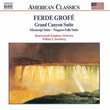| All Artists: Jean Sibelius, Herbert von Karajan, Okko Kamu, Berlin Philharmonic Orchestra Title: Sibelius: Symphony No. 2; Finlandia; Valse Triste Members Wishing: 0 Total Copies: 0 Label: Deutsche Grammophon Original Release Date: 1/1/2001 Re-Release Date: 9/18/2001 Album Type: Original recording remastered Genre: Classical Styles: Forms & Genres, Theatrical, Incidental & Program Music, Historical Periods, Modern, 20th, & 21st Century, Symphonies Number of Discs: 1 SwapaCD Credits: 1 UPC: 028946964729 |
Search - Jean Sibelius, Herbert von Karajan, Okko Kamu :: Sibelius: Symphony No. 2; Finlandia; Valse Triste
 | Jean Sibelius, Herbert von Karajan, Okko Kamu Sibelius: Symphony No. 2; Finlandia; Valse Triste Genre: Classical
|
Larger Image |
CD DetailsSimilarly Requested CDs
|
CD ReviewsBest Recording of These Sibelius Works Josh Rappaport | Harrisburg PA, 17110 | 04/17/2004 (5 out of 5 stars) "I've never heard any better recordings of any of these works. Herbert Von Karajan and the Berliner Philharmoniker play Sibelius' Finlandia with an excitement that no other conductor has ever conducted with, and he knows where to slow down and where to accellerate his tempi in this recording of the piece. I can say the same thing about the Symphony No. 2 recording. Okku Kamu actually does do better than most conductors on all four movements. The recording of the second mvt. here makes Sir Colin Davis's, Eugene Ormandy's, and Lorin Maazel's sound pathetic. The movements in this symphony have never before had this much beauty or excitement. Valse Triste is played with a real sense of sadness and beauty in which other conductors seem to speed up the tempo during this piece. Herbert Von Karajan really is the star of that Valse Triste recording, and with The Swan of Tuonela too. The Swan of Tuonela has never been conducted in a not-so-slow, not-so-fast pace by anyone. All the other conductors seem to go at a snails pace for no good reason in their recordings of The Swan of Tuonela, even Lorin Maazel. These are the absolute best performances of 4 of Sibelius's great orchestral works I've ever heard." Not impressed Peter Pirotte | Kansas City, MO | 01/18/2004 (3 out of 5 stars) "When I first played this disc, the opening bars of Finlandia made me excited for the rest of the album. Unfortunately, I was only disappointed. Although Karajan's Finlandia is well done, it seems that this success is only due to the simplicity of the work. The 2nd Symphony was where the majority of my problems lay. Despite the lush beauty of string playing that the BPO is famous for, the orchestra's sound is too often imbalanced, the strings sometimes obliterating the winds. Also, it seems, during the final two movements, especially, that too many sacrifices are made for the sake of speed and volume. The intonation is, at times, horrendous, and the symphony's glorious conclusion is ruined by the thoughtless, strident brass playing. There are many recordings available, I just picked the wrong one." Okko Kamu - a great Sibelian reaches Berlin Santa Fe Listener | Santa Fe, NM USA | 11/26/2005 (5 out of 5 stars) "Finnish conductor Okko Kamu, now largely forgotten, made recordings of Scandinavian music with his own Helsinki Radio Sym. for DGG and other labels a generation ago. So far as I know he only got to record with the Berlin Phil. once, in this 1970 Sibelius Second. This was Karajan's orchestra, of course, but he chose not to record this symphony a third time(his two version are on EMI with the Philharmonia and BPO), so perhaps that gave Kamu an opening.
In any event, the orchestra plays magnificently, the sonics are fine, and the performance is first rate. Sibelius is open to so many interpretive styles that I sometimes think there's no such thing as a bad Sibelius Second. This one is flexible, at times fiery and explosive, always expressive, and tremendously viruosic. Only the finale, which begins with a slow, low-key build, may give pause. The additional fillers are the familiar, and very successful ones from Karajan. Five stars." |

 Track Listings (7) - Disc #1
Track Listings (7) - Disc #1








